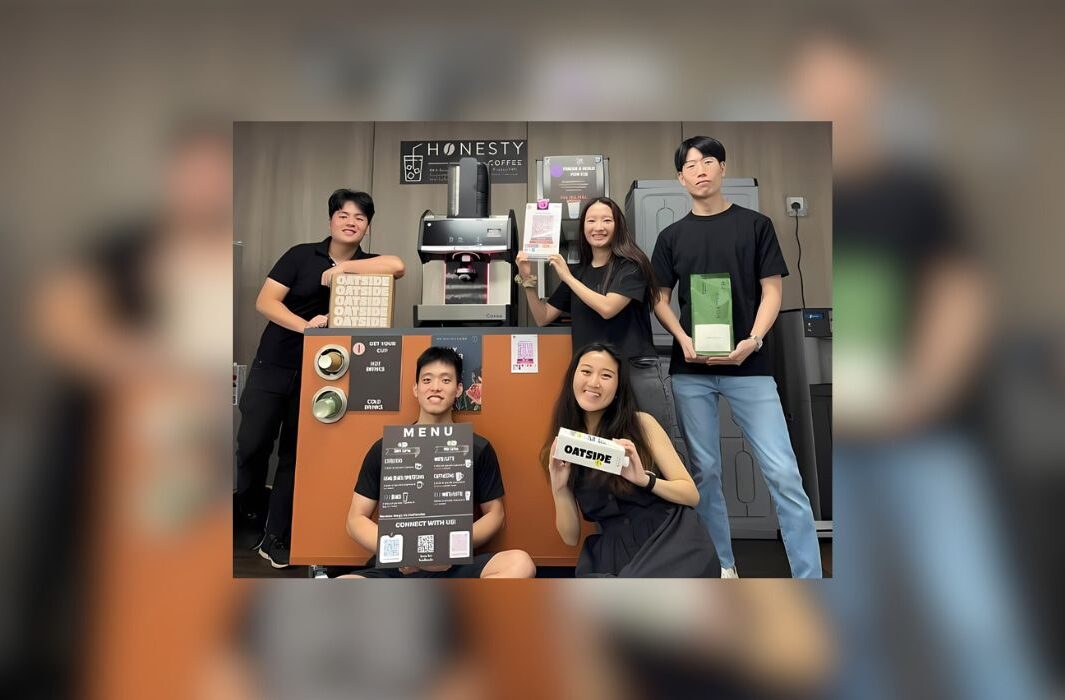Imagine an unmanned coffee booth where payments are based on trust.
This unusual concept became a reality thanks to BBA graduates Davin Ong, Tan Wei Xiang, and Carmel Choi, and current NUS Business School students Darius Teo and Eileen Lai who launched “Honesty Coffee” in NUS.
Located in the bustling Central Library, the coffee booth relies solely on an honour system and a single QR code for payment. And guess what? Based on the data collected since its launch, 95% percent of coffee lovers in the NUS community paid up for their coffee voluntarily! Beyond its success, Honesty Coffee represents a deeper learning experience for the five students. It is also a reflection of the good value system of the NUS community.
Living laboratory
It all started as a Field Service Project (FSP), where NUS Business School final-year undergraduates partner established organisations, social enterprises or non-profits to gain practical business experience. Typically, students provide consultation to client organisations. But, for this team, they decided to take it a step forward by proposing and testing a business concept for their client.
“I’ve always been inspired by my parents, as successful entrepreneurs they have always highlighted the importance of real life experience. This FSP has given me the opportunity to hone my skills,” shared Darius.
“For Honesty Coffee, we built it from scratch by coming up with ideas, testing, executing, and refining them,” said Davin, reflecting on the team’s work scope, which ranged from digital marketing campaigns to hands-on coffee machine repairs.
The FSP became a living laboratory for the five students, allowing them to apply their classroom knowledge while navigating the complexities of running a real business.
For instance, the team drew upon concepts from their operations classes, such as the service blueprint map, to optimise the customer experience. “We discovered that our initial menu guide was too text-heavy, so we incorporated visuals to make it more user-friendly,” Eileen explained.
But why would the group want to implement an honour system in the first place? “Based on our interactions with staff and students, we felt that the campus community was honest enough to pay for their coffee. We were also trying to keep costs down, and the occasional loss from non-paying customers was less expensive than integrating multiple payment systems beyond a single QR code,” Carmel admitted.
Learning out of the classroom
Amid these business decisions, the team also faced challenges not found in any textbooks. One memorable experience involved a frozen coffee mishap. “We bought a freezer to keep our milk fresh, but the entire stock became frozen instead,” Wei Xiang recalled.
The team also faced the daunting task of securing a prime location for their booth. “We spent weeks pitching our concept to different departments such as NUS Libraries and University Campus Infrastructure before getting approval,” recalls Darius. “The unwavering support and belief shown by everyone is a testament to the collaborative spirit at NUS.”
The team’s resilience paid off. Honesty Coffee quickly became a campus favourite, selling almost 500 cups a week – doubling the average of 250 cups sold per week by a vending machine on campus. Their success gave the team the confidence to pursue their entrepreneurial dreams.
The success of Honesty Coffee is a testament to the power of student initiative, the NUS community’s support, and the willingness to trust in people’s good intentions. It’s proof that with passion, perseverance, and a little bit of honesty, you can brew up your own success.




